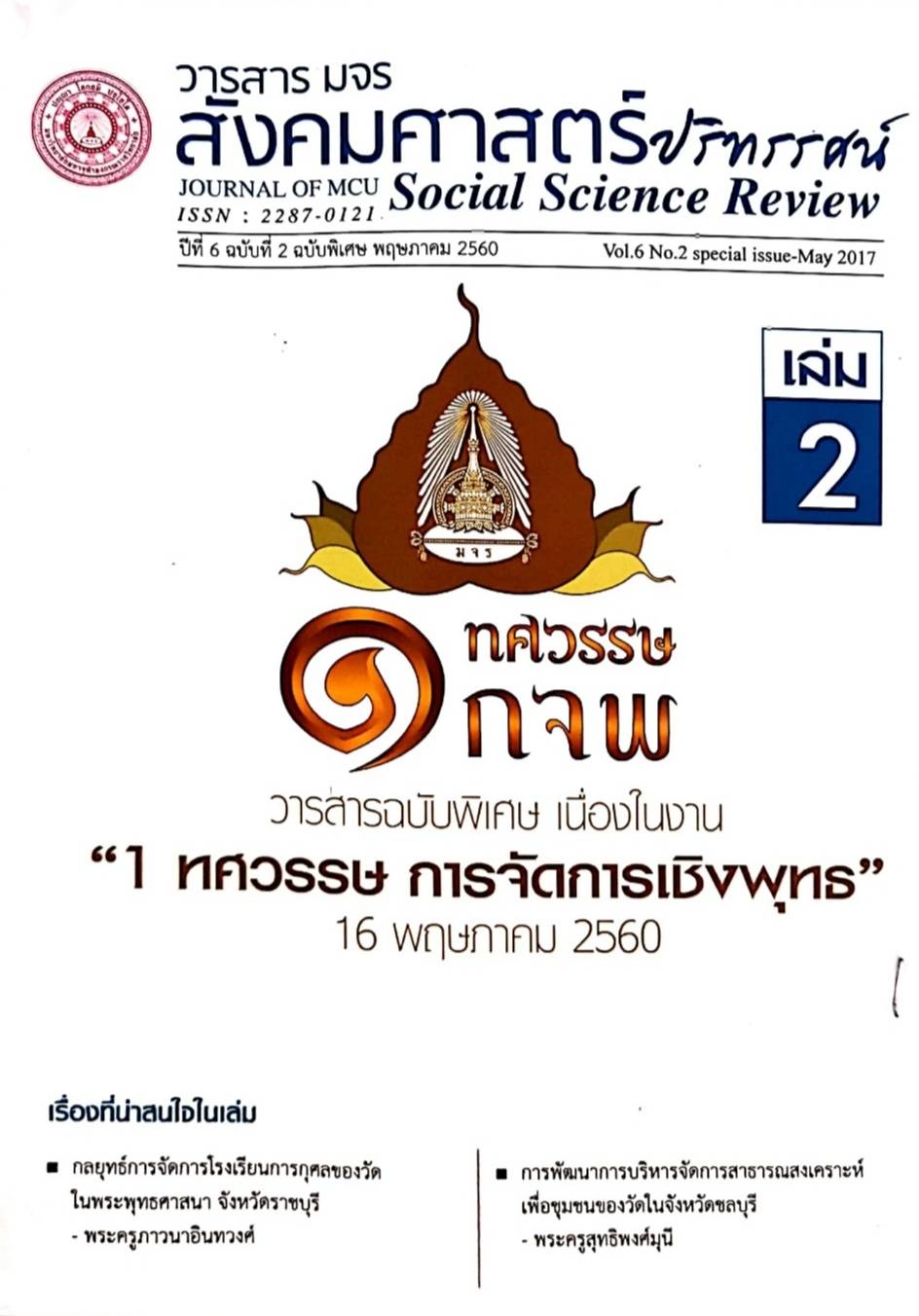องค์ประกอบ และพฤติกรรมบ่งชี้คุณลักษณะบัณฑิตที่พึงประสงค์ด้านคุณธรรม จริยธรรมของนักศึกษาปริญญาตรีวิชาชีพการโรงแรม
คำสำคัญ:
คุณลักษณะบัณฑิตที่พึงประสงค์,คุณธรรมจริยธรรม,นักศึกษาปริญญาตรีวิชาชีพการโรงแรมบทคัดย่อ
บทความนี้มีจุดมุ่งหมายเพื่อนิยามความหมาย องค์ประกอบ และพฤติกรรมบ่งชี้ของคุณลักษณะบัณฑิตที่พึงประสงค์ด้านคุณธรรม จริยธรรมของนักศึกษาปริญญาตรีวิชาชีพการโรงแรมงานวิจัยนี้ใช้วิธีการวิจัยเชิงคุณภาพโดยมีผู้ให้ข้อมูลหลัก ได้แก่ เจ้าของธุรกิจโรงแรม ผู้บริหารระดับสูงวิชาชีพการโรงแรม อาจารย์และนักวิชาการ ทีมีความเชี่ยวชาญด้านการจัดการเรียนรู้ทางด้านจิตวิทยาการศึกษา พุทธศาสนา การพัฒนาทรัพยากรมนุษย์ด้านการฝึกอบรม มีความเชี่ยวชาญทางด้านการเรียกการสอนด้านคุณธรรมจริยธรรมมีผลงานและประสบการณ์ที่เกี่ยวกับคุณธรรมจริยธรรม โดยใช้การสัมภาษณ์แบบเจาะลึกผู้ทรงคุณวุฒิ รวม 5 ท่าน และการสนทนากลุ่มผู้เชี่ยวชาญอีก 5 ท่าน แล้วนำมาวิเคราะห์เนื้อหา ผลของการศึกษาพบว่าความหมายของ คุณลักษณะบัณฑิตที่พึงประสงค์ด้านคุณธรรมจริยธรรม ของนักศึกษาปริญญาตรีวิชาชีพการโรงแรมได้แก่ ความประพฤติปฏิบัติในสิ่งที่ดีงามทั้ง กายวาจาและจิตใจโดยถือปฏิบัติเป็นประจา ความสามารถในการปรับตัว วิถีชีวิตในความขัดแย้งทางค่านิยม และเป็นแบบอย่างที่ดีทั้งการปฏิบัติต่อตนเองต่อผู้อื่นและต่อสังคมตามศีลธรรมเพื่อประโยชน์สุขของตนเองและส่วนรวม นอกจากนี้ยังจะต้องประกอบด้วยคุณลักษณะบัณฑิตที่พึงประสงค์ด้านคุณธรรมจริยธรรมในการทางานอีก 4องค์ประกอบที่สำคัญ คือ ความซื่อสัตย์สุจริต ความรับผิดชอบ ความมีวินัย การควบคุมอารมณ์ ซึ่งมีความสอดคล้องกับองค์ประกอบของคุณธรรม จริยธรรม จากสังเคราะห์ เอกสาร บทความ ที่ได้มีการศึกษาไว้แล้ว แต่ความหมายของคุณลักษณะคุณธรรม จริยธรรมของนักศึกษาปริญญาตรีวิชาชีพการโรงแรม เป็นคุณลักษณะลักษณะเฉพาะด้านโดยจะต้องคำนึงถึงการพัฒนาพฤติกรรมเกี่ยวกับการเรียนรู้และนำไปปฏิบัติสู่วิชาชีพในการบริการอย่างมีคุณภาพ
เอกสารอ้างอิง
โชคนิติ แสงลออ และศักดิ์ชัย เศรษฐอนวัช. (2557) การสร้างความจงรักภักดีของลูกค้า:การตรวจสอบและเปรียบเทียบคุณภาพบริการของธุรกิจที่พักแรมในภาคตะวันออกวารสารวิชาการมนุษย์และสังคมศาสตร์ ปีที่ 22 ฉบับที่ 40 กันยายน–ธันวาคม 2557.
ฐิติวัสส์ สุขปูอม. (2555). การพัฒนารูปแบบการเรียนการสอนตามแนวพุทธวิธีเพื่อเสริมสร้างคุณลักษณะบัณฑิตที่พึงประสงค์ด้านคุณธรรม จริยธรรมสาหรับนักศึกษามหาวิทยาลัยราชภัฎจันทรเกษม. ปรัชญาดุษฎีบัณฑิต สาขาวิชาจิตวิทยา กลุ่มวิชาจิตวิทยาการเรียนรู้และการสอน. กรุงเทพฯ: บัณฑิตวิทยาลัย มหาวิทยาลัยเกษมบัณฑิต.
เติมศักดิ์ คทวณิช. (2555). การพัฒนารูปแบบการเรียนการสอนเชิงจิตพิสัยแบบบูรณาการเพื่อเสริมสร้างพฤติกรรมประชาธิปไตยของนักศึกษาระดับปริญญาตรี ชั้นปีที่ 1 มหาวิทยาลัยเทคโนโลยีราชมงคลในเขตกรุงเทพมหานคร. ดุษฎีบัณฑิต สาขาจิตวิทยา กลุ่มจิตวิทยาการเรียนรู้และการสอน มหาวิทยาลัยเกษมบัณฑิต.
ปวีณา ศิวาลัย. (2557). การปรับตัวของธุรกิจโรงแรมไทยเพื่อ เข้าสู่ประชาคมเศรษฐกิจอาเซียนกรณีศึกษา: โรงแรมเอ็มโพเรียมสวีท บาย ชาเทรียม. วารสารการเงิน การลงทุนการตลาดและการบริหารธุรกิจ ปีที่ 4 ฉบับที่ 1 (มกราคม–มีนาคม 2557).
พระมหามงคล สามารถ. (2558). คุณลักษณะทางจริยธรรมของนักศึกษาคณะมนุษยศาสตร์และสังคมศาสตร์ มหาวิทยาลัยราชภัฏนครปฐม. ปริญญานิพนธ์หลักสูตรปริญญาการศึกษามหาบัณฑิต สาขาวิชาการอดุมศึกษา บัณทิตวิทยาลัย มหาวิทยาลัยศรีนครินทรวิโรฒ.
พิภพ วชังเงิน. (2545). จริยธรรมวิชาชีพ Professional Ethics.กรุงเทพฯ: รวมสาสน์ (1977) จำกัด
สายฝน บูชาและคณะ. (2550). คุณลักษณะของบัณฑิตสาขาวิชาการท่องเที่ยว การโรงแรมและภาษาอังกฤษเพื่อการสื่อสารสากลที่พึงประสงค์ตามทัศนะของสถานประกอบการ.กรุงเทพฯ: มหาวิทยาลัยเทคโนโลยีราชมงคลธัญบุรี
สมพร ฉั่วสกุล และคณะ.(2553). การศึกษาปัจจัยสาเหตุและแนวทางแก้ไขปัญหาการออกกลางคันของนักเรียนนักศึกษา สังกัดสานักงานคณะกรรมการการอาชีวศึกษาเขตตรวจราชการ ปีการศึกษา 2553. เอกสารลาดับที่ 16/2554 สานักบริหารยุทธศาสตร์และบูรณาการการศึกษาที่ 10 สานักงานปลัดกระทรวงศึกษาธิการ.
อรพินทร์ สันติชัยอนันต์. (2549). การศึกษาคุณธรรมและจริยธรรมของนิสิตนักศึกษาสถาบันอุดมศึกษาในเขตกรุงเทพมหานครและปริมณฑล. ปริญญานิพนธ์ กศ.ม. (การอุดมศึกษา).กรุงเทพฯ: บัณฑิตวิทยาลัย มหาวิทยาลัยศรีนครินทรวิโรฒ.
Berkowitz, M., & Hoppe, M. (2009). Character education and gifted children. High Ability Studies. 20(2), 131-142.
Berkowitz, M., & Puka, W. (2009). Dissent and character education. In M. Gordon (Ed.),Reclaiming dissent. Civic education for the 21st century. (pp. 107-130).Amsterdam: Sense Publishers
Borba, M. (2001). Building Moral Intelligence. The Seven Essential Virtues that Teach Kids to Do the Right Think. San Francisco, Jossey Bass
Davidson, M., Khmelkov, V., & Baker, K. (2011). Sustainability and enduring impact: Shaping an intentional culture of excellence and ethics. Journal of Character & Leadership Integration. 2(1): 35-50.
Josephson Institute. (2013). The Six Pillars of Character. Los Angeles: Josephson Institute (Center of Youth Ethics).
Lennick, D. and F. Kiel. (2005). Moral Intelligence: Enhancing Business Performance and Leadership Success. New Jersey: Pearson Education, Inc.
Lennick, D., & Kiel, F. (2011). Moral intelligence 2.0: Enhancing business performance and leadership success in turbulent times. Upper Saddle River, NJ: Prentice Hall
Pervin, L. A. (1994). A critical analysis of current trail theory. Psycological Inquiry. 5:103-113
Sigelman, C. K. & Rider, E. A. (2003). Life-Span: Human Development (4th ed.). USA:Wadworth/Thomson Learning
ดาวน์โหลด
เผยแพร่แล้ว
รูปแบบการอ้างอิง
ฉบับ
ประเภทบทความ
สัญญาอนุญาต
ลิขสิทธิ์ (c) 2020 วารสาร มจร สังคมศาสตร์ปริทรรศน์

อนุญาตภายใต้เงื่อนไข Creative Commons Attribution-NonCommercial-NoDerivatives 4.0 International License.
เพื่อให้เป็นไปตามกฎหมายลิขสิทธิ์ ผู้นิพนธ์ทุกท่านต้องลงลายมือชื่อในแบบฟอร์มใบมอบลิขสิทธิ์บทความให้แก่วารสารฯ พร้อมกับบทความต้นฉบับที่ได้แก้ไขครั้งสุดท้าย นอกจากนี้ ผู้นิพนธ์ทุกท่านต้องยืนยันว่าบทความต้นฉบับที่ส่งมาตีพิมพ์นั้น ได้ส่งมาตีพิมพ์เฉพาะในวารสาร มจร สังคมศาสตร์ปริทรรศน์ เพียงแห่งเดียวเท่านั้น หากมีการใช้ภาพหรือตารางหรือเนื้อหาอื่นๆ ของผู้นิพนธ์อื่นที่ปรากฏในสิ่งตีพิมพ์อื่นมาแล้ว ผู้นิพนธ์ต้องขออนุญาตเจ้าของลิขสิทธิ์ก่อน พร้อมทั้งแสดงหนังสือที่ได้รับการยินยอมต่อบรรณาธิการ ก่อนที่บทความจะได้รับการตีพิมพ์ หากไม่เป็นไปตามข้อกำหนดเบื้องต้น ทางวารสารจะถอดบทความของท่านออกโดยไม่มีข้อยกเว้นใดๆ ทั้งสิ้น





